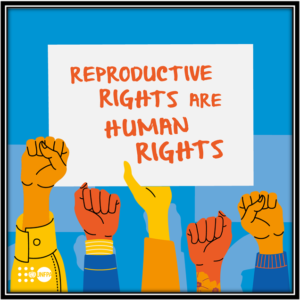
THE STIGMA AROUND THE REPRODUCTIVE HEALTH OF WOMEN, AND THE WAY FORWARD

INTRODUCTION
The stigma associated with women’s reproductive health is a pervasive and deeply ingrained problem that has an impact on women all around the world. There are several aspects of reproductive health, including menstruation, pregnancy, childbirth, family planning, and menopause.
Despite the significance of reproductive health to women’s overall health and welfare, the stigma surrounding reproductive health among women is a result of numerous societal and cultural attitudes. The stigma associated with women’s reproductive health is examined in this article along with its sources and effects, along with some potential solutions.

THE ROOTS OF STIGMA
Women’s reproductive health is stigmatised in a big way because of societal and cultural norms. Menstruation is stigmatised in many cultures, and women are frequently pressured to conceal their periods to avoid being rejected by their peers. Similar to how women who give birth outside of marriage are frequently embarrassed and ostracised, pregnancy and childbirth are frequently stigmatised.
Several civilizations stigmatise women who use contraceptives or seek abortions because they consider these behaviours to be unethical or evil. Lack of knowledge and awareness is another aspect of the stigma associated with women’s reproductive health. Many women lack access to fundamental reproductive health information and treatments, particularly those who live in rural areas. Discrimination results from this ignorance of damaging attitudes and actions.
The stigmatisation of women’s reproductive health is caused by several reasons, including:
- Social and cultural standards- What is deemed acceptable or taboo is frequently determined by social and cultural norms around gender roles, sexuality, and reproduction. These standards have the potential to stigmatise women who choose to use contraception or get an abortion, for example, or who don’t follow conventional gender roles.
- Religious convictions- Religious convictions may also help to perpetuate the stigma associated with women’s reproductive health. Some sexual acts or reproductive options may be viewed as evil or immoral in some religious doctrines, which can cause shame and stigma for people who engage in them.
- Lack of knowledge and education- Women’s reproductive health is often misunderstood and veiled in secrecy. Fear, shame, and stigma related to sexuality and reproductive health can result from a lack of education and understanding about these problems.
- Gender inequality: The stigmatisation of women’s reproductive health can also be attributed to gender inequity and discrimination. Women who use reproductive health services or engage in actions that are seen as abnormal may experience prejudice or criticism, which can result in stigma and shame.
- Political and legal considerations: Political and legal considerations, such as severe regulations on abortion and contraception, may also contribute to the stigmatisation of women’s reproductive health.
CONSEQUENCES OF STIGMA

Women’s physical, emotional, and mental health may suffer significantly as a result of the stigma associated with reproductive health. It might result in social exclusion, prejudice, and a rejection of fundamental human rights. Reproductive health is a taboo topic in many countries, and women may feel embarrassed to discuss their reproductive health problems or seek medical attention.
This stigma can keep women from getting the care they require, which can result in long-term health issues and some circumstances, even death. The lack of education and knowledge about family planning and contraception is one of the most important effects of the stigma around reproductive health. Women could lack access to correct information about birth control methods or other reproductive health services, making them more susceptible to unwanted pregnancies, unsafe abortions, and STDs (STIs).
THE WAY FORWARD
Furthermore, the stigma associated with reproductive health can be detrimental to mental health. Women may experience sadness, anxiety, and low self-esteem as a result of feeling guilty or ashamed about their reproductive health difficulties. Hence, there may be a decline in productivity, trouble creating satisfying relationships, and quality of life.
Governments, healthcare professionals, and communities need to work together in a concerted effort to combat the stigma associated with reproductive health. Campaigns for education and awareness can aid in reducing the stigma associated with questions of reproductive health and encourage open and honest discussion of these subjects.

By offering compassionate, evidence-based, and non-judgmental care, healthcare professionals can also significantly contribute to the reduction of stigma. Access to inexpensive, secure, and efficient reproductive health services, such as STI testing and treatment, family planning, and contraception, can also assist to lessen the stigma associated with reproductive health.
To sum up, stigmatising women’s reproductive health is a complicated issue driven by society and cultural norms, religious views, a lack of education and information, gender inequity, political and legal factors, and a host of other reasons. Women’s health and wellness may suffer as a result of the stigmatisation of reproductive health because it can cause shame, secrecy, and a lack of access to crucial reproductive health care.
Taking on this problem requires a multifaceted strategy that includes opposing damaging societal and cultural norms, raising awareness of reproductive health issues, advancing gender equality, and fighting for laws that promote women’s reproductive rights and health. We may endeavour to create a more welcoming and encouraging atmosphere for women’s reproductive health by doing these actions.





